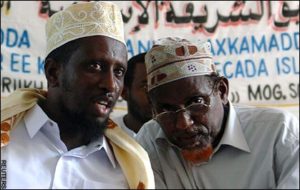By Liban Ahmad
On the tenth anniversary of the emergence of the Union of Islamic Courts (UIC) in Mogadishu, Somali writers have reflected on what UIC had achieved before its dissolution as a militant, Somali Islamist organisation. Some writers have dismissed the former UIC as a part of “ a vicious cycle of conflicts [in which ] …Islamic movements are the losers.” This assessment is flawed for several reasons. It fails to distinguish between one of the major achievements of the UIC and the wrong political decisions that brought about its downfall.
Until mid-2006 Mogadishu was ruled by ruthless warlords who, although being involved in the formation of the former Transitional Federal Government of Somalia (TFG) in Kenya in 2004, were reluctant to relinquish their political power in many parts of Mogadishu. Warlords forced the TFG to function first in Jowhar and then in Baidoa before the latter moved to Mogadishu in 2007, when UIC went underground to re-emerge as resistance movement.

Concerns about presence of foreign terrorists in Somalia gave warlords an opportunity to rejuvenate their power-base in the capital. In 2006 a group of warlords formed the Alliance for Restoration of peace and counter-terrorism (ARPCT) to counter the threat of Islamic Courts that were dispensing justice in many districts of Mogadishu after sub-clans grew tired of lawlessness on which warlords and their hangers-on had relied for support.
Union of Islamic Courts did not have a plan to attack warlords, who viewed both the then Baidoa-based Transitional Federal Government and Union of Islamic Courts as enemies. When the backers of ARPCT became public knowledge, the TFG leaders criticised the international community for seeking to cooperate with warlords at the expense of the government.
UIC leaders replaced two generations of Mogadishu-based politicians: those who formed the now-defunct United Somali Congress in 1989 in Rome, and the younger group of warlords who stepped into their shoes following the assassination of General Aideed in August 1996.
In less than two weeks UIC forces defeated warlords and turned Mogadishu into the most peaceful city in Somalia. The clan make-up of the UIC Consultative Council did not bother people of Bosaso, the commercial city of Puntland, who showed strong support for UIC, forcing the former Puntland President , General Addeh Muse, to agree to ruling Puntland ” according to Islamic law. Museh said a committee of scholars and traditional leaders will be created to implement Sharia.”
What undermined budding legitimacy of UIC was the campaign the group launched to conquer many parts of southern Somalia under the mantra “ people in the area have asked us to come here“. Another shortcoming within the organisation was the appointment of notorious warlords as top leaders of the UIC. The failure to distance UIC from clan militias who marginalised unarmed clans in and around the capital was a pragmatic consideration on the part of UIC leaders but it had alienated many people who initially viewed UIC as a break with warlordism. Warlords within UIC pushed an agenda to antagonise TFG and Ethiopia.
In six months UIC restored law and order in the capital, forced illegal occupants of some properties to return houses to rightful owners who came back to Mogadishu. This social justice approach in the UIC programme turned out to be a major, temporary achievement of an organisation that came into existence in response to threats from warlords funded by a foreign country. If the UIC leaders had known that they embarrassed backers of the ARPCT, they might have put a lot of thought into sharing power with the TFG instead of vowing to overthrow it under the pretext that the TFG was a puppet of the Ethiopian government.
Although early achievements of UIC are commendable, its leaders chose to be oblivious to achievements of other Somali administrations that created a political order after state collapse in 1991. The UIC offensive to conquer other regions in the south was akin to warlord campaigns of 1990s in the sense of polarising Somali clans. It was a political miscalculation that made Somalia woefully dependent on African peacekeeping troops envisioned by the former TFG President Abdullahi Yusuf Ahmed upon his election in 2004 and inadvertently put into practice by the Union of Islamic Courts.
It did not take long for people in many parts of southern Somalia to take UIC seriously as wielder of the coercive power of a state due to implementation of Sharia in areas under the group’s control. Defeat of warlords is still a popular accomplishment of the Union of Islamic Courts without which we could not be talking about restoring law and order in the capital.
Liban Ahmad
Email: [email protected]
We welcome the submission of all articles for possible publication on WardheerNews.com. WardheerNews will only consider articles sent exclusively. Please email your article today . Opinions expressed in this article are those of the author and do not necessarily reflect the views of WardheerNews.
WardheerNew’s tolerance platform is engaging with diversity of opinion, political ideology and self-expression. Tolerance is a necessary ingredient for creativity and civility.Tolerance fuels tenacity and audacity.
WardheerNews waxay tixgelin gaara siinaysaa maqaaladaha sida gaarka ah loogu soo diro ee aan lagu daabicin goobo kale. Maqaalkani wuxuu ka turjumayaa aragtida Qoraaga loomana fasiran karo tan WardheerNews.
Copyright © 2024 WardheerNews, All rights reserved


